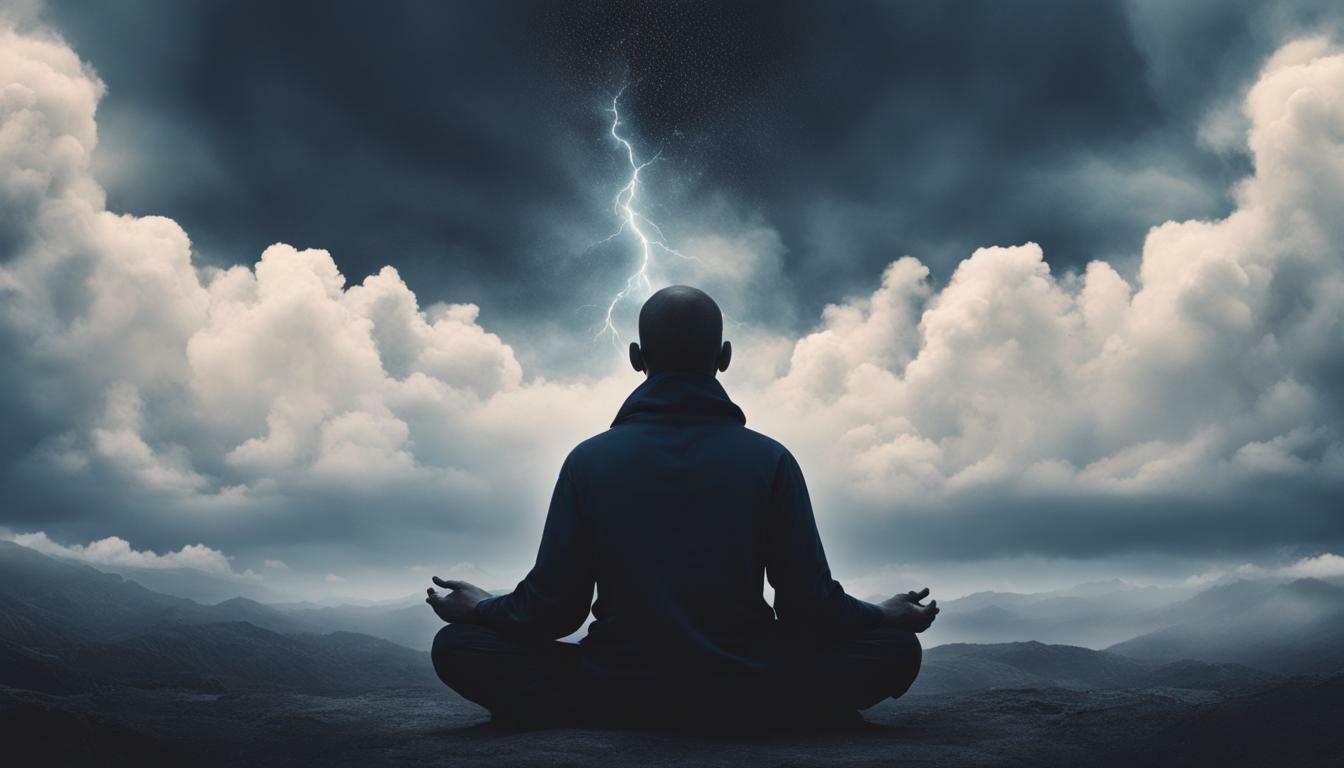If you’ve ever wondered which chakra is affected by depression and how it relates to your emotional well-being, you’re not alone. The chakras, which are energy centers in the body, play a crucial role in our mental health. Each chakra impacts our emotions and thoughts differently, and imbalances in these energy centers can contribute to conditions like depression.
Depression is a complex mental health disorder that can have various causes, and understanding the connection between chakras and depression can provide valuable insights into our emotional well-being.
Key Takeaways:
- Depression can be influenced by imbalances in the chakras, which are energy centers in the body.
- The root chakra, located at the base of the spine, can be affected by depression and is associated with feelings of hopelessness and anxiety.
- The sacral chakra, located in the lower abdomen, plays a role in depression and can contribute to a lack of pleasure in life when imbalanced.
- The solar plexus chakra, located at the navel, can impact depression and is connected to self-esteem and confidence.
- The heart chakra, located at the center of the chest, is related to love and relationships and can be influenced by depression.
These are just a few key insights into the connection between chakras and depression. By exploring the impact of each chakra on our mental health, we can gain a deeper understanding of ourselves and potentially find new avenues for healing and well-being.
The Root Chakra and its Impact on Depression
The root chakra, located at the base of your spine, plays a significant role in your overall emotional well-being, including its impact on depression. This foundational chakra is associated with stability, security, and a sense of being grounded. When the root chakra is imbalanced, it can contribute to feelings of hopelessness, anxiety, and loneliness, which are common symptoms of depression.
A blocked root chakra can leave you feeling emotionally depleted and disconnected from the world around you. It can also manifest as physical symptoms such as fatigue, insomnia, and digestive issues. By addressing imbalances in the root chakra, you can begin to restore a sense of stability and security within yourself, which can positively impact your mental health.
To heal and balance the root chakra, there are various techniques you can try. Grounding exercises, such as walking barefoot on the earth or visualizing yourself rooted like a tree, can help center your energy. Engaging in activities that promote a sense of safety and security, such as yoga, meditation, and spending time in nature, can also be beneficial.

Root Chakra Healing Techniques:
| Technique | Description |
|---|---|
| Crystals | Using crystals like red jasper, hematite, or smoky quartz can help balance the root chakra and promote grounding. |
| Aromatherapy | Essential oils such as vetiver, patchouli, or cedarwood can be diffused or applied topically to support root chakra healing. |
| Physical Exercise | Engaging in activities like walking, jogging, or practicing yoga can release stagnant energy and promote chakra balance. |
Key Takeaways:
- The root chakra is located at the base of the spine and influences emotional well-being, including its impact on depression.
- An imbalance in the root chakra can contribute to feelings of hopelessness, anxiety, and loneliness commonly associated with depression.
- Healing techniques such as grounding exercises, yoga, meditation, and engaging in activities that promote security can help balance the root chakra and improve mental health.
- Using crystals, aromatherapy, and physical exercise are additional tools that can support root chakra healing.
“When we bring awareness to our root, we create a solid foundation for emotional healing and well-being.” – Chakrabalancing.com
The Sacral Chakra and its Connection to Depression
The sacral chakra, situated in your lower abdomen, is closely linked to your emotions and the experience of pleasure, making it an important aspect to consider in understanding depression. When this chakra is imbalanced, it can lead to a lack of pleasure in life, difficulties with emotional expression, and even substance abuse. Addressing the healing of the sacral chakra can offer a pathway to alleviating symptoms of depression and restoring emotional well-being.
Imbalances in the sacral chakra can manifest in various ways. Some individuals may experience a disconnection from their emotions, feeling numb or apathetic. Others may have difficulty finding joy and pleasure in activities that once brought them happiness. Additionally, imbalances in this chakra can contribute to unhealthy coping mechanisms, such as turning to substances in an attempt to fill an emotional void.

Healing Techniques for the Sacral Chakra
There are several effective methods for healing and balancing the sacral chakra. Engaging in creative activities, such as painting, dancing, or writing, can help stimulate the flow of energy in this chakra. Additionally, exploring and expressing emotions through therapy or journaling can aid in releasing emotional blockages.
Another powerful practice for healing the sacral chakra is mindful meditation. By bringing awareness to this energy center and focusing on sensations in the lower abdomen, individuals can activate and harmonize the sacral chakra. This practice can help restore emotional balance, promote self-acceptance, and enhance overall well-being.
| Healing Techniques for the Sacral Chakra | Benefits |
|---|---|
| Engaging in creative activities | Stimulates energy flow and encourages self-expression |
| Exploring and expressing emotions through therapy or journaling | Helps release emotional blockages and promotes emotional healing |
| Mindful meditation | Restores emotional balance and enhances overall well-being |
Remember, healing the sacral chakra is a journey that requires self-compassion and patience. Incorporating these techniques into your routine, along with seeking professional support, can empower you to find balance and experience greater emotional stability in your life.
The Solar Plexus Chakra and its Influence on Depression
Your solar plexus chakra, located at the navel, affects your sense of personal power and self-worth, making it an important consideration in understanding the connection between chakras and depression. When this chakra is imbalanced, it can contribute to feelings of low self-esteem, self-doubt, and anxiety.
A blocked solar plexus chakra can manifest in various ways, impacting your mental health. You may find yourself constantly questioning your abilities and feeling inadequate. Making decisions can become a daunting task, as you doubt your judgment and fear failure. These feelings of insecurity and self-doubt can often lead to anxiety, further intensifying the symptoms of depression.
To restore balance to your solar plexus chakra and alleviate symptoms of depression, there are various techniques you can try. Chakra healing practices such as meditation, chanting, and visualization can help clear any blockages and restore the flow of energy. Additionally, engaging in activities that boost your self-confidence and sense of personal power, such as practicing assertiveness or setting and achieving goals, can have a positive impact on your overall mental well-being.
| Symptoms of Imbalanced Solar Plexus Chakra | Techniques for Healing |
|---|---|
|
|
By addressing imbalances in your solar plexus chakra, you can foster a sense of empowerment and enhance your overall mental well-being. Remember, seeking professional guidance in incorporating these alternative healing methods into your depression treatment plan is key to ensuring a holistic approach to your mental health.
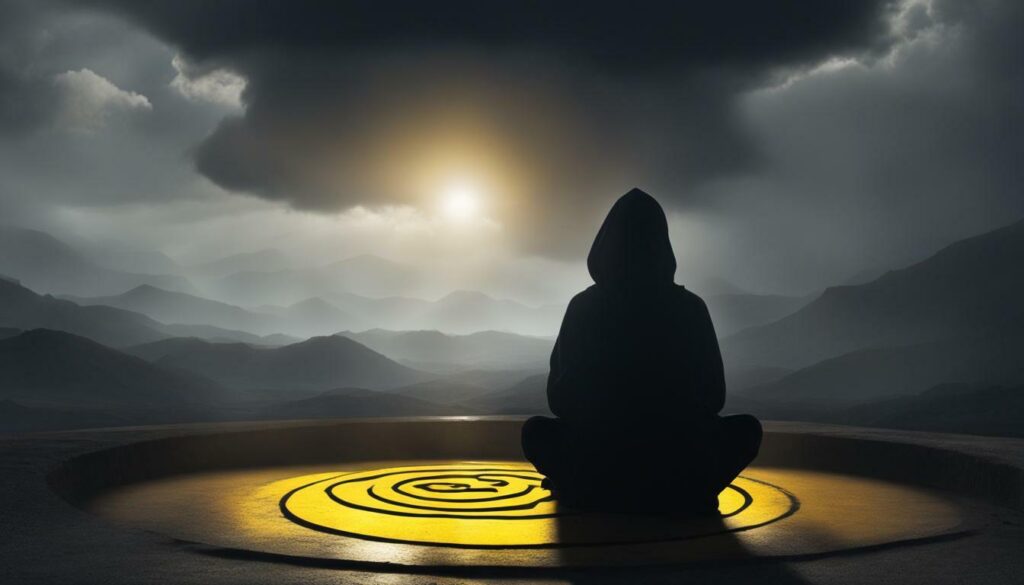
Quote:
“Unleashing the power of your solar plexus chakra can help you regain your inner strength and confidence, empowering you to overcome the challenges of depression.”
The Heart Chakra and its Role in Depression
The heart chakra, situated at the center of your chest, is intimately tied to your ability to give and receive love, making it an essential aspect to understand when exploring the impact of chakras on depression. When the heart chakra is imbalanced, it can have a profound effect on your emotional well-being, contributing to feelings of unworthiness, relationship struggles, and jealousy.
Imbalances in the heart chakra can manifest in various ways. You may find it difficult to form deep and meaningful connections with others, leading to a sense of loneliness and isolation. Relationships may become strained, as you struggle to trust and open yourself up to love. Negative emotions, such as resentment and envy, may overshadow your ability to experience genuine joy and happiness.
Healing the heart chakra involves embracing self-love and compassion. This can be achieved through practices such as meditation, affirmations, and energy healing. By nourishing your heart chakra, you can cultivate a greater sense of self-worth, strengthen your relationships, and invite more love and kindness into your life.
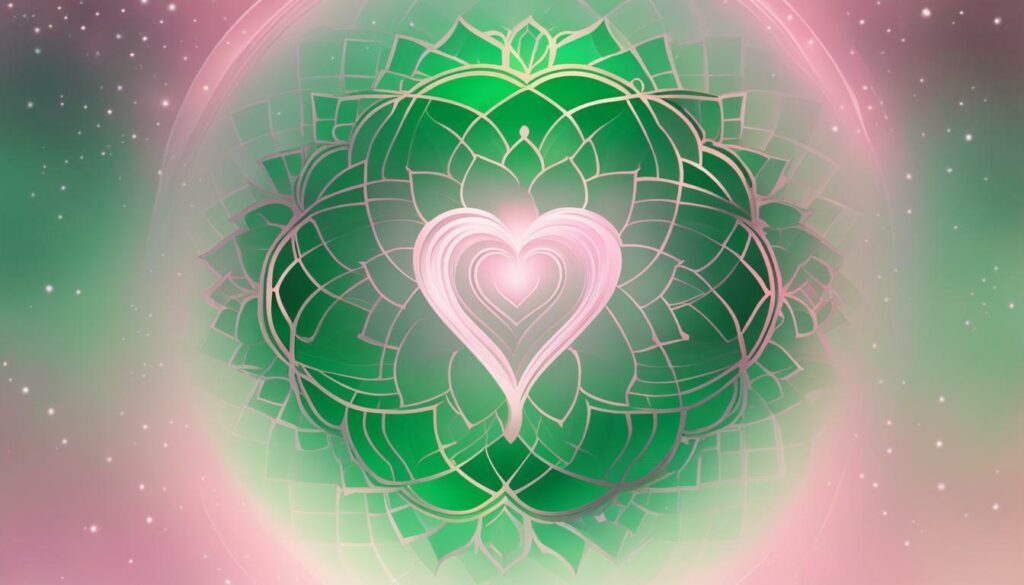
| Signs of Imbalance in the Heart Chakra | Ways to Heal and Balance the Heart Chakra |
|---|---|
|
|
Remember, healing the heart chakra is a journey of self-discovery and self-love. Stay open to the process, and with time and patience, you can work towards restoring balance and finding greater emotional well-being.
The Throat Chakra and its Influence on Depression
The throat chakra, positioned at the center of your neck, plays a vital role in your ability to communicate and express yourself, making it an integral part of understanding depression and its relationship with chakras. When this chakra is imbalanced, difficulties in self-expression, fear of speaking, and social anxiety can arise, all of which are commonly associated with depression.
Imbalances in the throat chakra can manifest as an inability to effectively express thoughts and feelings, leading to a sense of isolation and frustration. Individuals with a blocked throat chakra may feel unheard and struggle to communicate their needs, which can contribute to feelings of depression and a sense of disconnection from oneself and others.
In order to heal and balance the throat chakra, various techniques can be utilized. Chanting, singing, and engaging in creative activities that involve self-expression can help to open and activate this energy center. It is also important to cultivate a safe and supportive environment that encourages open communication and the sharing of thoughts and emotions.
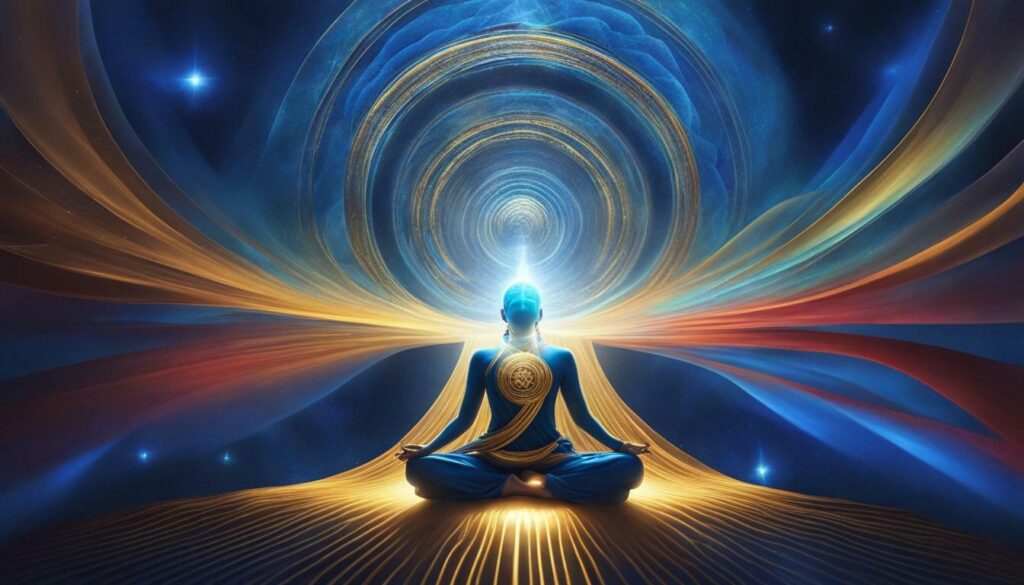
Table: Characteristics of a Balanced and Imbalanced Throat Chakra
| Characteristics of a Balanced Throat Chakra | Characteristics of an Imbalanced Throat Chakra |
|---|---|
| Clear and effective communication | Difficulty expressing thoughts and feelings |
| Confidence in self-expression | Fear of speaking and being heard |
| Authenticity in speech | Difficulty in asserting one’s needs |
By addressing and healing the throat chakra, individuals with depression can begin to regain their voice, reconnect with their authentic self, and foster healthier communication with others. It is essential to remember that chakra healing techniques should be used in conjunction with professional guidance and support to ensure comprehensive and effective treatment for depression.
The Third Eye Chakra and its Impact on Depression
Your third eye chakra, located between your eyebrows, governs your intuition and spiritual insight, making it an important consideration when exploring the impact of chakras on depression. This energy center plays a vital role in how we perceive the world and understand ourselves.

When the third eye chakra is imbalanced, it can manifest as insecurity, indecision, and overthinking, which are often associated with depression. You may find yourself doubting your own abilities, lacking clarity in your life, and feeling disconnected from your inner wisdom.
Healing the third eye chakra can involve various practices, including meditation, visualization, and energy healing. One effective technique is to focus on stimulating this chakra by envisioning a vibrant indigo light spinning and expanding in the area between your eyebrows. As you do this, imagine your intuition and insight becoming clearer and more reliable.
Benefits of Third Eye Chakra Healing for Depression
- Enhanced clarity and concentration
- Heightened intuition and inner guidance
- Increased self-awareness and insight
- Greater spiritual connection and understanding
| Chakra | Location | Association | Symptoms of Imbalance |
|---|---|---|---|
| Root Chakra | Base of the spine | Security, stability | Feelings of hopelessness, anxiety, loneliness |
| Sacral Chakra | Lower abdomen | Emotions, creativity, pleasure | Lack of pleasure, substance abuse |
| Solar Plexus Chakra | Navel | Power, confidence, self-esteem | Low self-esteem, self-doubt, anxiety |
| Heart Chakra | Center of the chest | Love, balance, relationships | Feelings of unworthiness, relationship struggles, jealousy |
| Throat Chakra | Center of the neck | Self-expression, communication | Difficulty expressing thoughts and feelings, fear of speaking, social anxiety |
| Third Eye Chakra | Between the eyebrows | Intuition, spiritual clarity | Insecurity, indecision, overthinking |
| Crown Chakra | Top of the head | Spiritual connection, higher consciousness | Taking things personally, lack of spiritual connection, victim mentality |
Remember, chakras are complex energy centers, and their impact on mental health is multifaceted. If you’re struggling with depression, it’s essential to seek professional guidance along with considering alternative healing methods.
By paying attention to and healing your third eye chakra, you may find that your intuition becomes clearer, providing valuable insights to navigate through your depression. Embracing the balance and wisdom within you can be a powerful tool in your journey toward mental well-being.
The Crown Chakra and its Influence on Depression
The crown chakra, situated at the top of your head, is deeply connected to your sense of spirituality and higher purpose, making it an essential aspect to examine when considering the impact of chakras on depression. This energy center is associated with the color violet or white and is believed to be the gateway to divine consciousness.
When the crown chakra is blocked or imbalanced, it may manifest as a lack of spiritual connection, a feeling of disconnection from the greater universe, and a sense of isolation. Individuals with imbalances in this chakra may struggle to find meaning in their lives and may experience a sense of purposelessness, which can contribute to feelings of depression.
The crown chakra is also associated with taking things personally and having a victim mentality. Imbalances in this chakra can lead to heightened sensitivity to criticism or rejection, causing individuals to internalize negative experiences and perceive themselves as victims. This negative self-perception can further contribute to depressive symptoms.
To promote balance in the crown chakra and alleviate symptoms of depression, various practices can be helpful. Meditation, mindfulness, and activities that cultivate a sense of spirituality, such as prayer or connecting with nature, can all support the healing and alignment of the crown chakra. Seeking guidance from a professional who specializes in chakra healing can also provide valuable insights and techniques tailored to your specific needs.
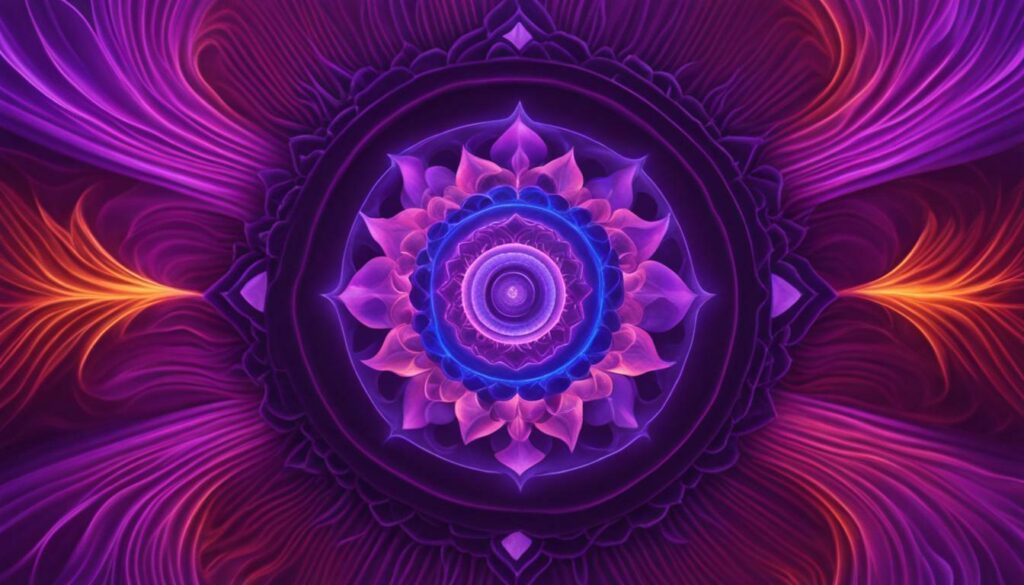
Remember, while the concept of chakras and their influence on mental health is widely accepted in many spiritual traditions, it’s important to note that scientific evidence supporting their existence is limited. However, some studies suggest that practices like chakra meditation may help alleviate anxiety caused by stressors, which can indirectly impact depressive symptoms. If you’re struggling with depression, it’s always advisable to seek professional guidance and support.
Chakra Meditation and its Potential Benefits for Anxiety in Depression
While scientific evidence regarding chakras is limited, some studies suggest that chakra meditation may offer potential benefits for managing anxiety associated with depression. Chakra meditation is a practice that focuses on balancing and harmonizing the body’s energy centers, known as chakras, through various techniques such as visualization, chanting, and breathing exercises.
By targeting specific chakras that are associated with anxiety and depression, chakra meditation aims to restore balance and promote overall well-being. For example, focusing on the root chakra, which is located at the base of the spine, can help alleviate feelings of depletion, hopelessness, anxiety, and loneliness often experienced in depression.
During chakra meditation, individuals can use visualizations to imagine their chakras as spinning wheels of energy, clearing any blockages and restoring the flow of energy throughout the body. By directing attention and intention to specific chakras, individuals can cultivate a sense of calm, relaxation, and inner peace, which can help reduce anxiety symptoms that often accompany depression.
| Chakra | Location | Associated Symptoms |
|---|---|---|
| Root Chakra | Base of the spine | Feelings of hopelessness, anxiety, depletion |
| Sacral Chakra | Lower abdomen | Lack of pleasure, substance abuse |
| Solar Plexus Chakra | Navel | Low self-esteem, self-doubt, anxiety |
| Heart Chakra | Center of the chest | Feelings of unworthiness, relationship struggles, jealousy |
| Throat Chakra | Center of the neck | Difficulty expressing thoughts and feelings, fear of speaking, social anxiety |
While chakra meditation may not be a standalone treatment for depression, integrating it into a comprehensive treatment plan can potentially enhance overall well-being and provide additional tools for managing anxiety symptoms. It’s important to note that individuals should consult with a healthcare professional before starting any alternative healing methods, including chakra meditation, to ensure it complements their current treatment and aligns with their individual needs.
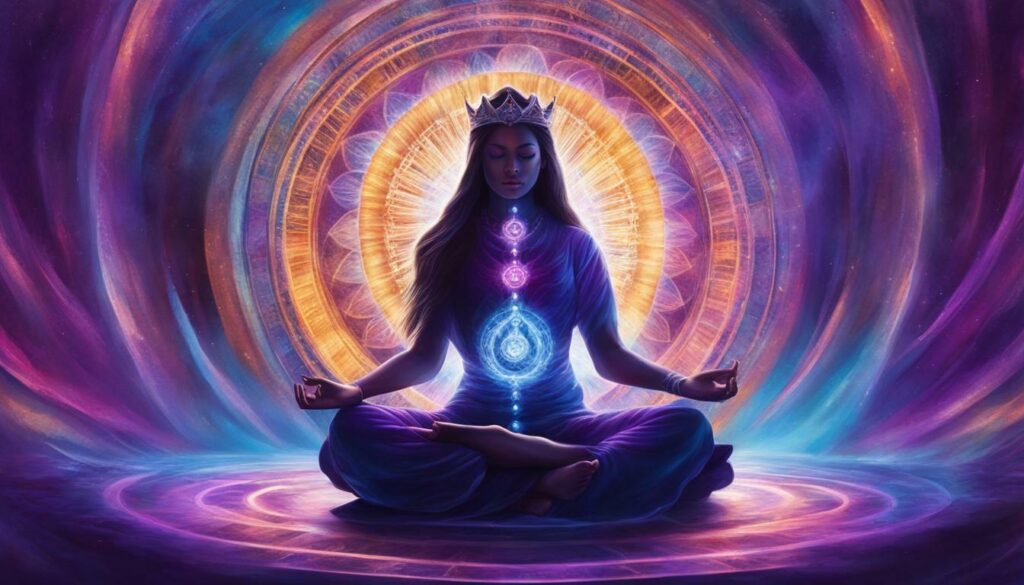
Integrating Chakra Healing into Depression Treatment
Integrating chakra healing techniques into your depression treatment plan can be a complementary approach to support your overall well-being, but it’s crucial to consult with healthcare professionals to ensure you’re receiving comprehensive care. While scientific evidence supporting the existence of chakras is limited, many people find that working with chakras can be beneficial for managing their mental health.
Chakra healing techniques aim to balance and harmonize the energy centers in the body, promoting a sense of well-being and emotional stability. These techniques can include various practices like meditation, yoga, Reiki, and crystal healing, all of which focus on restoring the flow of energy through the chakras.
When integrating chakra healing into your depression treatment plan, it’s important to approach it as a complementary practice rather than a sole treatment. Chakra healing can work alongside conventional therapies such as medication and talk therapy to provide a more holistic approach to your mental health. It can help you develop a deeper understanding of your emotions, release emotional blockages, and cultivate a greater sense of self-awareness.
Remember, chakra healing is not a substitute for professional medical care, and it’s essential to consult with your healthcare provider before making any changes to your treatment plan. They can offer guidance on how to incorporate chakra healing techniques safely and effectively, taking into account your specific needs and circumstances.

Conclusion
Understanding the connection between chakras and depression can offer valuable insights into the complex interplay of emotions, mental health, and energy centers within our bodies. Each chakra plays a unique role in our overall well-being, and imbalances in these energy centers can contribute to various symptoms associated with depression.
If you’re struggling with depression, it’s important to remember that seeking professional guidance is essential. While the concept of chakras may not have extensive scientific evidence supporting it, incorporating alternative healing methods such as chakra meditation can potentially offer additional support alongside traditional depression treatment.
By exploring the root chakra, sacral chakra, solar plexus chakra, heart chakra, throat chakra, third eye chakra, and crown chakra, we can gain a deeper understanding of how these energy centers impact our mental health. By working to balance and harmonize these chakras, we may be able to alleviate some of the symptoms associated with depression.
Remember, everyone’s journey to healing is unique, and what works for one person may not work for another. It’s always important to consult with a qualified professional who can guide you through a comprehensive treatment plan tailored to your individual needs. Together, we can navigate the path towards emotional well-being and find the support we need.
FAQ
Q: Can imbalances in the chakras contribute to mental health problems?
A: Yes, imbalances in the chakras can have an impact on mental health. Each chakra influences mental health in different ways, and imbalances can lead to various mental health problems.
Q: Which chakra is associated with feelings of depletion and anxiety when blocked?
A: The root chakra, located at the base of the spine, is associated with feelings of depletion, hopelessness, anxiety, and loneliness when blocked.
Q: How does imbalances in the sacral chakra affect mental health?
A: Imbalances in the sacral chakra, located in the lower abdomen, can lead to a lack of pleasure in life and potentially contribute to mental health issues such as depression.
Q: How does imbalances in the solar plexus chakra impact self-esteem?
A: Imbalances in the solar plexus chakra, located at the navel, can result in low self-esteem, self-doubt, and anxiety, which are often associated with mental health problems like depression.
Q: Does imbalances in the heart chakra affect relationships?
A: Yes, imbalances in the heart chakra, located at the center of the chest, can lead to relationship struggles, feelings of unworthiness, and jealousy, which can contribute to mental health problems, including depression.
Q: How does imbalances in the throat chakra impact communication?
A: Imbalances in the throat chakra, located at the center of the neck, can manifest as difficulty expressing thoughts and feelings, fear of speaking, and social anxiety, which are often associated with mental health problems like depression.
Q: How does imbalances in the third eye chakra contribute to insecurity?
A: Imbalances in the third eye chakra, located between the eyebrows, can lead to insecurity, indecision, and overthinking, which are often associated with mental health problems such as depression.
Q: Can imbalances in the crown chakra affect spirituality?
A: Yes, imbalances in the crown chakra, located at the top of the head, can result in a lack of spiritual connection, taking things personally, and a victim mentality, all of which can contribute to mental health problems, including depression.
Q: Is there scientific evidence supporting the existence of chakras?
A: Scientific evidence supporting the existence of chakras is limited. However, some studies suggest that chakra meditation may help alleviate anxiety caused by stressors that can contribute to mental health problems like depression.
Q: How can chakra healing be integrated into traditional depression treatment?
A: Chakra healing techniques can be integrated into traditional depression treatment plans. It is essential to seek professional guidance when incorporating alternative healing methods alongside traditional treatment.
